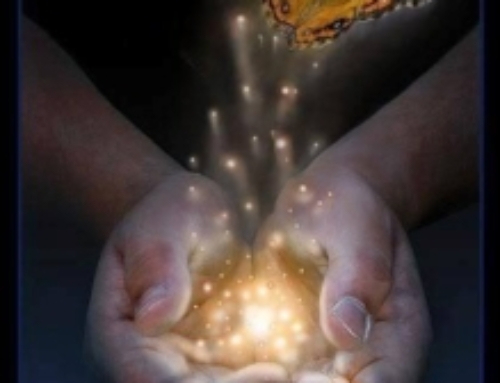“You are not a drop in the ocean. You are the entire ocean in a drop.”
~ Rumi
If you are like me, you might be struck by how much divisiveness prevails everywhere these days, online, offline, among ourselves, and within ourselves… No community and no one seems to be completely immune from it, even when we feel that we are above it, as I recently witnessed on one of my local listservs. Personally, the online / media experience is always the most painful one, hence my keeping as much distance as I can from it and being mindful of what I read and watch. Yet, I am fully aware of the many other ways the energy of division can affect me, like everyone else. I also witness, in the healing room, how much this contributes to so many individuals suffering from a total disconnect from themselves as well. This was at the center of one of my recent contemplative walks and also of a post I wrote for the Peace ReWire project. So I wanted to share with you some insights from neuroscience about how the experience of transcendence can help transform these feelings, as well as suggestions of simple practices that can help you better anchor a sense of interconnectedness.
The mind separates and categorizes
Everything in the universe is connected. An ancient knowing, so easy to forget. It is the nature of the mind to do so. To make sense of the complexity of the world, the mind separates and categorizes. Simplifying through categorization, the mind is able to generalize and create a sense of order. This differentiation is not inherently negative or detrimental; in fact it supports us to make sense of and navigate the world with more ease than would otherwise be available. And yet, one’s identification with an in-group (which often also posits an ‘us v. them’ binary, with a strong influence on the way we perceive the world) can be predictive of bias. When these biased perceptions become polarized or imbued with power, conflict and potentially violence may ensue.
In our daily lives, if we are minimally aware, it is not difficult to see how often we function in a “self-other” dichotomy and how difficult it can be to move beyond this duality. As firmly as we may believe in interconnectedness and the beauty of a diverse world, it is easy to forget in actually living our lives, in particular when we are triggered, one way or another.
Experiencing transcendence helps transform the separative energy
There is a key spiritual experience, however, that can help transform the separative energy for ourselves and others: transcendence. Transcendence of the ego is intrinsically linked to an experience of interconnectedness (the sense of being connected with everyone and everything around). Here, spirituality is truly approached as an experience, beyond the belief system and even the values one may hold. It is a genuine experience of being part of a larger, universal whole, of being moved by the same energy that flows through every other living being, and yet embodying and expressing it in a very unique way.
Two additional character strengths often associated with transcendence are the sense of hope and surrender that it generates. The experience of transcendence tends to support a general sense of well-being, which helps not only move away from fear but help the brain relax and function outside of automatic responses that might be maladaptive. In other words, the experience of transcendence can contribute to greater control over the stress response and help inhibit pre-potent defensive responses long enough to allow social emotions and social-bonding mechanisms time to operate.
The experience of transcendence is also associated with an emotional decentering and distancing that comes from a surrender to something bigger than oneself. Its by-products generally are an increase in self-awareness, calmness, clarity, and trust. Initial research has been published on the study of the impact of prayer on reducing alcohol craving (a stress response) and also the brain activity that is associated with the physiology of the flight or fight response. This hypothesis is still fairly speculative at this stage of the neuroscience development; however, similar dimensions have also been highlighted when helping mitigate the effects of trauma.
Surrendering to a wider dimension also generally comes with an experience of larger meaning making: it helps give sense to what happens in the world. Even if you do not have the words for it yet, things feel less empty, less like a void ready to absorb you.
You can experience transcendence and nurture interconnectedness in your daily life
Transcendence is often perceived as an exceptional experience that you might have once in your lifetime, if you are lucky. But, in reality, it can and actually needsto be nurtured on a daily basis, through rituals and other forms of deliberate practice. In order to continue to feed the brain, it needs to be embodied with repetition and regularity.
Wherever you are in your life and in your journey, I encourage you to identify the simple practices that can help you anchor this sense of interconnectedness. They don’t need to be complicated to be powerful. You don’t need to “formally” pray or meditate every day, if it is not your thing.
For instance, simple contemplative practices, repeated deliberately, can have a lasting impact on the neuro processes:
- If visualizing comes naturally to you, allow an image of interconnectedness or unity to form in your mind’s eye. Stay with it, perhaps long enough to allow yourself to merge with the image. When you are ready to transition out of this practice, gently open your eyes and slowly start looking at your surroundings;
- If nature inspires you and you live close to a stream: sit and watch it, listening to the water and letting all other sounds recede. Allow the sound to merge with the sounds of your own body, as you simply observe your experience;
- While walking in the street, allow yourself to truly see someone you don’t know who is smiling and smile in response.
Such experiences help nurture the sense of transcendence and deep interconnectedness. The last two examples bring special benefits that neuroscience is progressively researching as mirroring and synchronicity (and some have called heart coherence). Synchronized group movements, in particular, contribute to creating a sense that individuals are part of a larger social whole. When applied to human beings only, marching in step, chanting, dancing, playing music in unison, singing together and other synchronous ritualistic activities help activatemirror neurons through mimicry. Some experiments have shown that they could have long-lasting effects on prosocial behavior after the period of mimicking has ceased. But, more generally, activating mirror neurons contributes to the development of a greater ability to mentalize (understood as the ability to read the mental states of others, a skill that enhance empathy) which, in turn, increases trust and cooperation.
When connecting with nature, the body can experience similar benefits and the brain gets trained into activating those mirror neurons so important for nurturing the interconnectedness with other human beings.
Practiced with intention and attention, those practices help foster a quality of relationship that is so vital to our life in society.
Let me know which practice helps you the most nurture your sense of interconnectedness, and always remember: “You are not a drop in the ocean. You are the entire ocean in a drop.”
Béatrice Pouligny, PhD | Shamanic Healer and Spiritual Mentor
Co-founder and co-director of Peace ReWire
beatrice.pouligny@shamanicspiritualhealing.com
Laura Webber | Research Associate at Peace ReWire








Leave A Comment